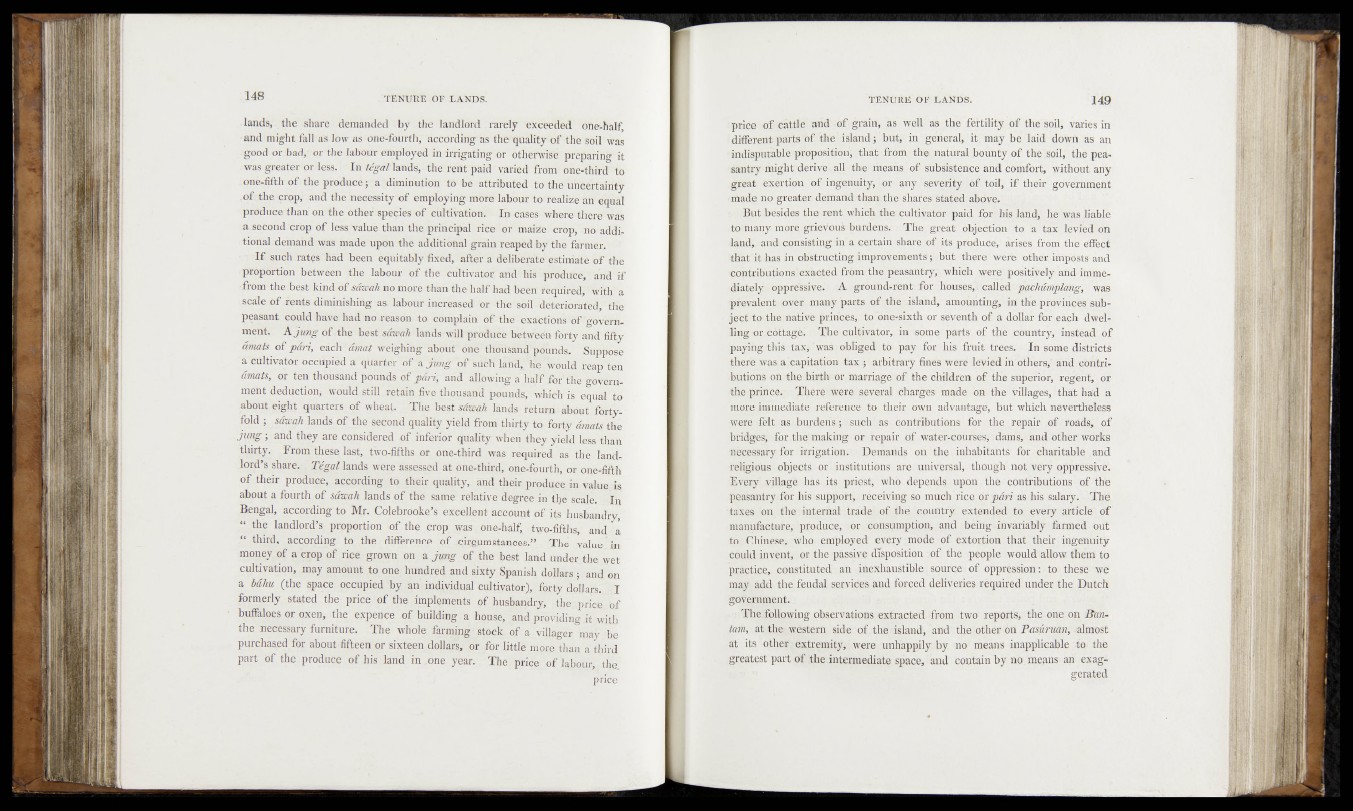
• lands, the share demanded - byvthe landlord . rarely 'exceeded ohe-half
-and might fall asdow as one-fourth/ accprding’a s th e ’>qualityro f1 the soil was
good or. bad, orThe labour employed'in Irrigating ot other'wis'fe preparing^
was greater or less.. In Afg-a* lands, the”reh rp a id ' varied from1 one-third to
: one.fifth ofj the produce; a ’diminution to be attributed to’-fhe^uheertairity
.of-the crop, and the'necessity of employing more labour to'realize'an equal
producedhan on' the other species -of- cultivation. In-cases - where dhere'-was
a second.'cr'op of less;value .than the .principal rice Of: maize crop, ^ a d d i -
tional.demand’was made upon the additional grain reapedby the farme r/1'?
■ h I f such rates had -been equitably fixed,- after a' delibefafeestimate. of the
proportion between dhe labour of the-eultivator and his :produfae,; and i f
-from the .best kind of faffld.no more than the half had been -rreqtiirfedr?,<with' a
. scale o f,rents diminishing .as. labour increased 'or the soil'dete rio r^ ted rfe
peasant could have had nodeason to complain of I th e 1 exkctionbofIgd'vern-
ment. A ju n g of the best sawdh lands-will prddac'e between forty and-fifty
dmals o f pa ri, each* dmat weighing about* one-thousand pounds. 'Suppose
a cultivator occupied !a quarter o f Ja jtm g dand,5?e: fwduld reap ten
dmats, or ten thousand pounds o f p a n , and -allowing a "halffor'the govern-
ment deduction; would still retain five thousand pounds, ’ which is equal "to
about eight quarters - qf wheats The best sdwah lands return abdii't'Jfoffy- -
fold ; jam a h lands of die second quality yield from thirty tq Torty dmats the
ju n g ; and they are considered of inferior quality wherpthey yield loss than
thirty. From-these last,. two-fifths or , one-third was required, as the landlord’s
share, jj Tegal lands were assessed at one-third, one-fpurtli' pr- b'rje^fifth
of theft produce, according to their quality, and theft,produce. in yalue^is
about a fourth of sdwah lands of the same r e l a t i v e ^ t h e -In
Bengal, accordingto Mr. Colebrooke’s excellent account of its'husbandry-
‘‘ the landlord’s, proportion of the crop was, one-half, t^o-fiftlis,' and a
/ ‘ ■third, according to the difference of _cirgiimstances.” The ysluejlh,
money, of a crop of , rice grown on a. ju n g o f the best land u n ^ e r^ e wet
cultivation, may amount .to one hundred and sixty Spanish dollars j and on
a bdhu (the space occupied by an-individual cultivator),-, fortydollars.
formerly • stated ..the^ptme^of th e timplqmeuts of husbandry, the"prie'el"q!f
buffaloes or oxen, -the .expence of building a house, and providing it with
the necessary furniture. The whole farming stock of a villager, may be
purchased for about fifteen or sixteen dollars, or for little more than a third
part of the produce of his land in .one year. The price of labour, the,
a price
-'price -of’cattle- and mf'grain, as well as the fertility, of the soil, varies in
1 different parte hf:^he^ island ^btiti'in general, it. may be-laid down as an
‘indisputable proposition,',that from the natural'Jjounty of theiso'il,' the peasantry
migh/'derive..all ■' the ^means'*of subsistence and comfort, without any
.great exertion .ofyingeriultyior rany 'severity^Öfi toil, if "their government
-made no 'greater, demand’thatfi the-shares stated above.
{>: •Bptlbdsidesith.'^t’cp^which the^cultivatOr paid fori his land, he was liable
,'totmahy m.ore.fgrie.Vous'bur'déhs.ï^ The/grpari- óbjectiori£to' a tax levied on
-land, andi consisting infa certain-sharp fqf^its produce,'' arises’ from the effect
that'it has in obstructing improvements jWb'ut (there! Were other impdstsJand
•cont-ributionsrexaqteftfrom thel'peasantry,'; which were'-positively- and immed
ia te ly oppressive.' A 'ground-rent; for: houses;’» called^pachwmplang, was
ipfevalentft&ïèrï- many parts ófrthe -.island, amounting,1 iff the provinces subject
-to-ithemafeive prihcesy toiohersixth or’seventh' of a dollar for’eléh dwelling,
pr-.cóTttagèl ; The cultivator, inKsóme/ parts of the-'-country, instead of
Jpa^bg^hil’dax, 'was.|oblgedi' tö pay. for his fruifetie^si-C In some districts
there jwas. a capitation tax y arbitrary fines;we're levied in others/ and contri-
on^he.'bftthcoivmarriage of the children of 'the superior, ''regent,'-dr
jthe prktcey. jThérè^errifseveral charges made on--the?!villages, 'that had a
itóreptn mediate "refer e'nQq»te< their own advantage, but which nevertheless
were dplb asJ.bhrdemii^Sudhs as contributions for 1®§j,repair of-roads," of
bridg-esj for,the'making- or repair of water-courses, dams, and other works
•nhcessaryifer.irrigatibrr.mllpemahds on the inhabitants for-charitable .and
■religidus /objects; or. .'institutions are universal, thep^ghl notTyUry- qpprëssiyè'.
Every!yvillagb. has its priest,.] who depends!-upon the - contributions of th:e
Ilgfea'Hjfryribr his support, receiving so much rice or pari as-his salary. The
■ falxesi fen if heiinterhal tradei.ofj the "country extended to ^yery- article o'f
manufacture,; ipraduce, vór/éonsiimption, and j being. invariably - farmed out
to wiftlinese,'- who .employed* every ;modeo of, extortion’that their ingenuity
could invént,-J or the qjassive- disposition -.of/ Jhe)>people would "allow them tri
practice, constituted, an ■inexhaustible^ source'-: of oppressions to these We
may- add- the.feudal' setvides>and forced deliveries required! under the Dutch
government...
i Thejfollowing observations;exfraot-ed-ffrdm -two' reports,--the one .on Bantam,
at thesiwéstern sideuof/therisland, and the'other on Pasuruan, .almost
dt its other; extremity,! were unhappily by no'means inapplicable to the
greatest part df/the,intermediate space, and contain by no. means-aii exaggerated